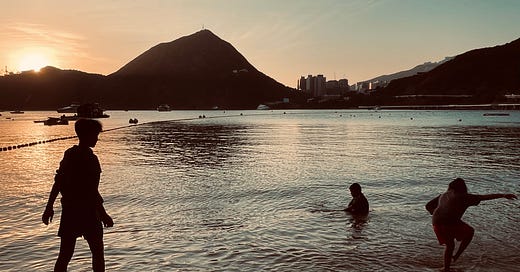Since my son was very little, he’d always been keen on animals and nature; catching baby geckos or tiny frogs with his bare hands, wrapping his arms around the neck of any dog who’d let him, spending hours wading in tide pools looking for hermit crabs and snails. One day, during the pandemic years, I bought him a fishing net, affixed to the end of a long pole, and a plastic bucket, and we concocted a lockdown activity that consisted of going to the beach and ‘netting’.
I remember that first summer’s day well. I spread out a picnic blanket on the deserted sandy beach, sat cross-legged, and watched as my son stood thigh-deep in sea water, scanning the depths like a hungry egret, waiting for flashes of movement. He’d suddenly plunge his fishing net into the waves and either whoop with jubilation or mutter silently with frustration. If he caught something, he’d splash back onto the shore excitedly, shouting “Mama, Mama, look what I got!” After we’d ooohed and aaahed at the wriggly crab or the silvery fry, he’d gently pop his captives into his plastic bucket, full of seawater and half submerged in the soft sand, christen said creature with some random name, and tear back into the surf. At the end of the day, as the sun began its fiery descent into the horizon, my son carried his full bucket gingerly back towards the sea, releasing his newfound friends back into their watery world with a wave and a scatter of shells. This activity became a sort of habit. Every couple of weeks, we’d pass a few hours with a calmness and serenity that feels nothing short of miraculous when I look back upon those moments now.
It was several years later, on an unusually mild afternoon in early December, when my son suggested, rather out of the blue, that we go ‘netting.’ I was surprised, but secretly elated. How could I refuse? We headed out to Deep Water Bay, a lovely public beach about 30 minutes’ drive from home, the net and bucket both firmly lodged in the front passenger seat that my son was, by now, big enough to occupy. We arrived, secured a rare parking space, and he was out like a shot, racing towards the waves with unbridled enthusiasm as I sauntered after him with my blanket, my tote bag and a tea-filled thermos. I scanned the beach just long enough to identify which figure in the distance was my son - the beach having returned to its pre-pandemic busyness - and settled down to tap out some emails on my phone.
By the time I looked up again, my son’s hazy form had been joined by two smaller ones. The three shapes would converge momentarily, then separate, then converge again, in some sort of choreographed performance where my son was the lead dancer, being double the height of the other two children, and much more deliberate and languid in his movements. The little girl had long, free-flowing hair and the little boy was brandishing my son’s fishing net as they pranced around him like a pair of energetic puppies with their beleaguered mother. I smiled, bemused, and returned to my work. I was sure the introductions would come, and soon enough, they did, as the sun began to set and the air began to turn chilly. “Are you his mother?” demanded the little girl, cocking her head towards my son, a paper plate piled high with shells in one hand and her other hand pressed against her hip. As I nodded, the little girl and the little boy (her younger brother, I was informed) thrust their paper plates at me, inviting me to enjoy the “special feast” that they’d spent all afternoon painstakingly cooking on the beach. My son shrugged as if to say “Don’t look at me! They’re not my kids!” Taking a deep breath, I dipped my fingers into the sand-encrusted shells, raising them in turn to my lips and pretend-savouring their deliciousness. The two imps giggled with delight, before turning to grab my son’s hands and pulling him back to the sea to play some more.
Before we left the beach that day, I’d established that the two children were Nepalese, that they visited the beach on weekends where their parents would BBQ with friends, and please, could we wear the same clothes the next time we came so that the siblings could find us again? “I like playing with him,” the little girl had pouted, pointing a finger at my sheepish son. There were remnants of sparkly nail polish on her tiny fingernails. “Of course,” I said, promising to set aside our clothes from today for our next outing to this beach. I may have even pinky promised.
In the car, I ruffled my son’s hair, sprinkling us with fine sand. “You netted yourself two big fish today,” I teased, as he tucked his net and bucket around his legs in the front seat. “Did they tell you their names?” he asked, as I started the car. I stopped, realising that they had, but I’d not written them down. Which meant their names had already disappeared from my sieve-like memory like footprints on a beach at high tide. But wait. I felt in my shorts pocket for a pair of mussel shells, spread like butterfly wings, a tasty offering that the younger brother had insisted I keep from his overflowing plate of pretend-plenty. Dropping the shells into my son’s plastic bucket, we headed home, warmed by the memory of our newly found, nameless friends.





A heartwarming vignette, thank you!
I loved this story. It reminds us that time spent with our children or other children is never lost. It helps to keep us young in spirit to share in their wonder of the natural world. Philip